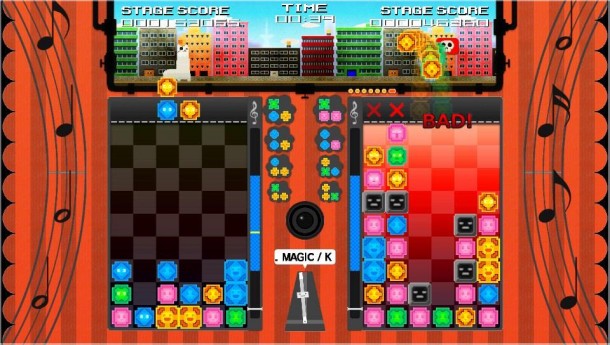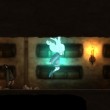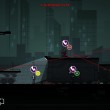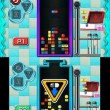Magical Beat Review
Developer Arc System Works is best known for its fighting games, which include favorites like BlazBlue, Guilty Gear, and Persona 4 Arena. But the company is much more than a fighting game factory; it also creates and publishes numerous smaller games of varied genres. Magical Beat is an initially intriguing puzzle game with a striking retro visual style and a musical hook to its color-matching gameplay. This challenging and enjoyable Vita exclusive has all of the fundamental qualities of a sleeper hit--but ultimately hits a bit of a flat note.
Magical Beat is a falling-block game with a rhythm-based twist. While this description probably brings to mind the beloved puzzler Lumines, Magical Beat is quite distinct from that game in several ways. For starters, gameplay is always done in versus format, pitting you against either a human or a CPU-controlled foe. The object is to match up chains of three or more colored, anthropomorphic blocks called "beatons" in any combination of vertical or horizontal directions to send attacks over to your foe. Unlike most puzzlers of this sort, the blocks don't fall on their own: you rotate and move them above the field to your liking before pressing a button to drop them directly into the field.
It's that part about dropping them of your own volition that helps set Magical Beat apart from the pack. As you play, a meter with a small bar inside of it sits alongside the field, and the bar shifts up and down in tandem with the stage's soundtrack. To successfully drop your pieces onto the field, you must press the button when the bar is within the blue area at the meter's center. Do this, and your pieces successfully drop; fail, and the beaton pieces break apart and fall in random places. Watching the meter itself is something of a hindrance, however. Instead, you should pay careful attention to the beats of the song, dropping your pieces when you hear the appropriate sound cues.
To beat your opponents, you need to be aggressive, creating combos and giant chains of same-colored beatons. There's a delay, as in Lumines, before the same-colored blocks you match up actually disappear from the playfield, allowing you a few precious seconds of time to set up a few more three-or-more chains of beatons before they all vanish. Unlike in Lumines, however, there's no visual cue for when the pieces will vanish from the field, meaning you need to pay extra attention to the music to get a sense of how long you have to create chains. The more chains you make--and the larger the clusters of eliminated beatons are--before they vanish, the more field-obstructing crud drops on your foe's side of the screen. If said junk piles up beyond the top of the arena, you win.
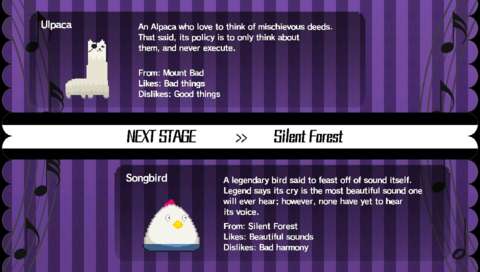
The drop restrictions and the hard time limit for combos combine to create a challenging--but fun--puzzle game that requires you to not only be quick with pattern identification and decision-making, but also have a keen ear for timing. You also can't go straight into panic mode when you notice one column of beatons growing dangerously high, lest you drop offbeat and wind up making your problems even worse.
While the game feels great once you get the hang of it, the learning curve is unforgiving; the tutorial is limited, and the difficulty of opponents ramps up quickly. One of the game's scant few options allows you to turn off the beaton-breaking penalty for dropping a piece offbeat, and though it does make the game considerably easier, it robs it of a quality that helps make it unique, turning it into just another fairly standard puzzle game.
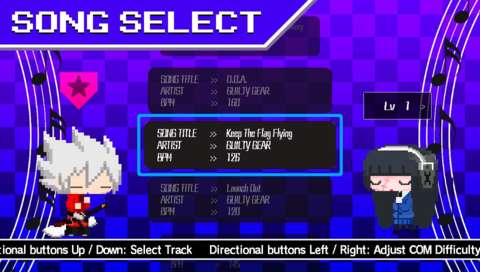
You can't have a music-heavy game without a solid soundtrack, and fortunately, Magical Beat delivers on this front. There's a good variety of music offered of varying speeds and styles, and the speed of a stage's backing track can have a noticeable effect on gameplay. Many of the songs share a common trait: the use of Vocaloid synthesized vocals, the same technology behind Hatsune Miku. (In fact, if you're familiar with Miku's distinct "voice," you'll immediately recognize her in some of the tracks.) The songs are charming and catchy, and combined with the cute sprite graphics, they help create an upbeat, cheery atmosphere for fierce puzzle fighting. But even if the initial soundtrack isn't up your alley, beating the game once lets you play on stages featuring hard-rock tracks from Arc System Works' popular fighting games BlazBlue and Guilty Gear.
Unfortunately, that's about the full extent of interesting extra content in Magical Beat. The game features three single-player modes of ascending difficulty, each featuring a typical arcade-style progression of foes until you reach and beat the final enemy. There's no story or dialogue to speak of, just a parade of cute-looking characters whose fields you valiantly attempt to fill with junk. A fourth single-player mode allows you to pick your desired music and opponent difficulty for a single match. That's basically all there is for the solo experience; you can play as every character in normal to earn some bronze trophies, but even that isn't a terribly interesting incentive to stick with Magical Beat. A dedicated, non-versus single-player mode could have been a great addition to the package, but unfortunately, you won't find it here.
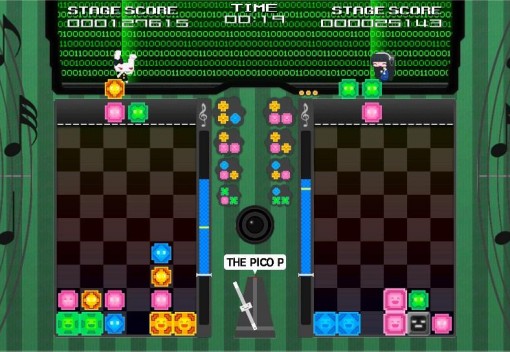
Multiplayer is where Magical Beat would theoretically shine brightest, and gameplay certainly does get quite fevered playing against a human opponent, provided you're OK with a limited set of match-creation options. On top of that, you can only fight local opponents; there's no online functionality built into the game. This makes finding competition significantly more challenging, and makes the already bare-bones versus mode look even more anemic. Yes, you can use a workaround like AdHoc Party to get past this limitation, but it seems ridiculous to need to do that for a competitive game in this day and age.
Magical Beat, while cleverly designed and audiovisually charming, feels stripped down. The game lacks the sorts of options and modes that help elevate a standard puzzle game to the level of cherished time-killer and competitive classic. Though a handful of nifty unlockables make for fun fan service, they don't add much to the threadbare single- and multiplayer modes. It's a real shame that this cute concert feels like it's over before it has barely started.

